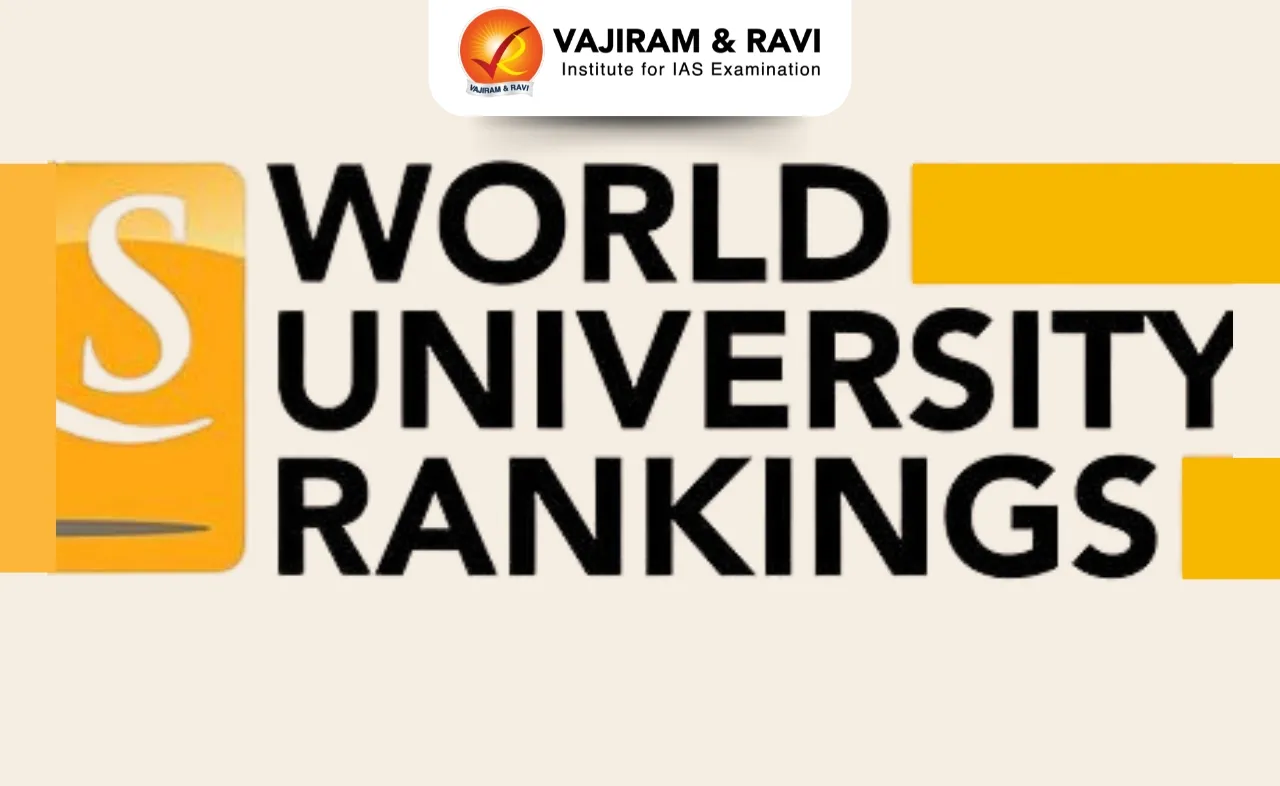QS World University Rankings Latest News
The QS World University Rankings recently released its latest edition of rankings of higher education institutions across the world.
About QS World University Rankings
- It is published annually by global higher education consultancy Quacquarelli Symonds.
- The QS rankings evaluate universities on several parameters, including academic reputation, overall score, employer reputation, and employment outcomes.
- The 2026 edition evaluated 8467 institutions and featured over 1,500 institutions from more than 100 countries, marking shifts in global higher education performance.
- This year’s rankings introduced a new International Student Diversity (ISD) metric as an unweighted indicator.
QS World University Rankings 2026 Highlights
- The Massachusetts Institute of Technology (MIT), United States, holds the top position for the 14th straight year.
- It is followed by Imperial College London and Stanford University, which climbed from sixth to third.
- Other institutions in the top ten include the University of Oxford, Harvard University, the University of Cambridge, ETH Zurich, the National University of Singapore (NUS), University College London (UCL), and Caltech.
- The US remains the most represented country overall, with 192 institutions featured in the list, and most showing improved positions.
- China continues its strong presence, with Peking University at 14th (92.6), and Tsinghua University rising to 17th with a score of 91.2. Fudan University, another university from China, climbed nine spots to reach the 30th position, while the Chinese University of Hong Kong (CUHK) secured the 32nd rank.
- India has achieved an all-time high in the rankings, with 54 institutions featured in the 2026 list-a significant rise from 46 in 2025 and 45 in 2024.
- With this, India has become the fourth most represented nation globally, following the United States, the United Kingdom, and China.
- Eight Indian universities are new entrants this year, the highest from any country, marking India’s position as the fastest-growing G20 nation in the QS rankings, with a remarkable 390% increase in representation over the past decade.
- Leading the Indian contingent is the Indian Institute of Technology (IIT) Delhi, which has climbed to the 123rd position globally, jointly ranked with the Georgia Institute of Technology, USA. This marks the institute’s highest-ever rank, up from 197th in 2024 and 150th in 2025.
- IIT Bombay, although down from its all-time high of 118 last year, continues to feature in the global top 130, ranking 129th overall.
- Meanwhile, IIT Madras recorded a remarkable jump of 47 spots to reach 180th, entering the global top 200 for the first time.
- Nearly half (48%) of India’s ranked institutions improved their positions this year.
- Five Indian universities made it to the global top 100 for Employer Reputation, and eight institutions secured a place among the top 100 globally for Citations per Faculty – a research quality metric – achieving an average score of 43.7, ahead of Germany, the UK, and the US.
Top 10 Indian Institutes in QS World University Rankings 2026
- IIT Delhi – Rank 123
- IIT Bombay – Rank 129
- IIT Madras – Rank 180
- IIT Kharagpur – Rank 215
- IISc Bangalore – Rank 219
- IIT Kanpur – Rank 222
- University of Delhi – Rank 328
- IIT Guwahati – Rank 334
- IIT Roorkee – Rank 339
- Anna University – Rank 465
Source: IE
Last updated on August, 2025
→ UPSC Mains Admit Card 2025 has been released on 14th August at www.upsc.gov.in.
→ UPSC Mains 2025 will be conducted on 22nd August 2025.
→ UPSC Notification 2025 was released on 22nd January 2025.
→ UPSC Calendar 2026 is released on 15th May, 2025.
→ UPSC Prelims Question Paper 2025 and Unofficial Prelims Answer Key 2025 are available now.
→ UPSC Prelims Result 2025 is out now for the CSE held on 25 May 2025.
→ The UPSC Vacancy 2025 were released 1129, out of which 979 were for UPSC CSE and remaining 150 are for UPSC IFoS.
→ UPSC Prelims 2026 will be conducted on 24th May, 2026 & UPSC Mains 2026 will be conducted on 21st August 2026.
→ The UPSC Selection Process is of 3 stages-Prelims, Mains and Interview.
→ UPSC Result 2024 is released with latest UPSC Marksheet 2024. Check Now!
→ UPSC Toppers List 2024 is released now. Shakti Dubey is UPSC AIR 1 2024 Topper.
→ Also check Best IAS Coaching in Delhi
QS World University Rankings FAQs
Q1. Who publishes the QS World University Rankings annually?+
Q2. Which university topped the QS World University Rankings 2026 for the 14th consecutive year?+
Q3. Which Indian institution achieved the highest rank in the QS World University Rankings 2026?+
Q4. How many Indian institutions were included in the QS World University Rankings 2026?+
Tags: Prelims Pointers qs world university rankings upsc current affairs upsc prelims current affairs














